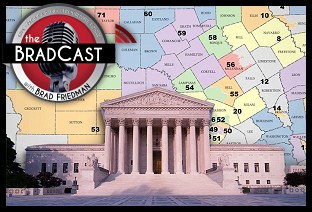 The fight to block brand new, unverifiable (and, of course, hackable) voting systems continues as election officials in a number of jurisdictions (including some key Democratic-leaning ones) are rushing to implement them despite unambiguous warnings from experts and as the national media (after years of our own warnings) have finally begun to take notice.
The fight to block brand new, unverifiable (and, of course, hackable) voting systems continues as election officials in a number of jurisdictions (including some key Democratic-leaning ones) are rushing to implement them despite unambiguous warnings from experts and as the national media (after years of our own warnings) have finally begun to take notice.
But first, very quickly, some of the many news headlines from the weekend and today covered on today's BradCast. [Audio link to full show is posted below.]
- Former Attorney General Eric Holder announces he is not running for the 2020 Democratic Party Presidential nominee, but Colorado's two-term Governor and self-described "extreme moderate" John Hickenlooper declares that he will be joining the crowded field of mostly U.S. Senators;
- Bizarre extreme weather across much of the U.S. as one or more mile-wide "monster" tornadoes flattened parts of Beauregard, Alabama on Sunday, killing at least 23, including a still-unknown number of children, with dozens still missing;
- NBC reports the Pentagon is set to announce the U.S. is permanently ending annual large-scale joint-military exercises with South Korea and Japan following Donald Trump's failed summit with North Korean dictator Kim Jong-Un. The U.S. is, apparently, receiving no concessions from the North in return;
- Rand Paul became the fourth U.S. Senate Republican to say he will vote to block Trump's "national emergency" declaration, which diverts money military construction money allocated by Congress in order to build a southern border wall instead. Paul's vote, along with Democrats and a handful of other Republicans who have said they will also vote against Trump, would be enough for a majority in the Senate to pass the bill already adopted by the House. Donald Trump, however, has vowed to veto the measure;
- And, in far more embarrassing news for the President today, the U.S. House Judiciary Committee --- where any possible impeachment hearings would begin --- has requested a host of documents from more than 80 Trump officials, family members and organizations as it investigates impeachable issues of obstruction of justice, corruption and abuse of power by Donald J. Trump;
Meanwhile, our years-long attempt to wave a large, bright red warning flag regarding U.S. elections, especially in advance of 2020, continues today. But, over the weekend, I'm happy to say, we received a bit of help, finally, from the national media as Politico's Eric Geller ran a feature article summarizing some of the many warnings (see here [PDF] and here [PDF], for example) from cybersecurity and voting systems experts inveighing against new, touchscreen computer Ballot Marking Devices (BMDs) now being adopted or considered by jurisdictions around the country, including Georgia, Delaware, Philadelphia and elsewhere (including counties in Texas, Ohio and even here in L.A. County, the nation's largest voting jurisdiction.)
Officials are now rushing to adopt the new systems in advance of the 2020 Presidential elections. That, despite the mountain of evidence demonstrating that BMD systems cannot be reliably audited [PDF] after elections and will result in elections as faith-based and hackable-without-probability-of-detection as those on many of the older touchscreen systems they will be replacing. The boondoggle is set to be a bonanza for the private voting machine vendors, however, which stand to make hundreds of millions by forcing all voters at the polls to use unnecessary electronic systems, rather than much cheaper, verifiable, hand-marked paper ballot systems tallied by optical-scan computers or counted by hand.
Nowhere has the fight against these dangerous new systems been more contentious than in Georgia, where the state House has already voted, mostly along party lines, to move to the systems and as lawmakers in the state Senate are now on the brink of adopting the same bill, HR-316, as well. The measure would grant at least $150 million for the purchase of electronic touchscreen systems that produce an unverifiable, bar-coded (not human-readable), computer-marked "paper ballot" summary card which is no more verifiable than their 17-year old, oft-failed, easily-manipulated paperless touchscreen voting systems.
But, never mind that. The state's new Republican Governor and former Sec. of State (and infamous vote suppressor) Brian Kemp has long been pushing for such systems, as is his new successor, Republican Sec. of State Brad Raffensberger. A former official from ES&S, the nation's largest voting machine company, which will likely receive the contract to replace all current voting systems in Georgia, is also now said to be serving as Kemp's Deputy Chief of Staff.
We're joined again today by election integrity champion MARILYN MARKS of the non-profit Coalition for Good Governance with an update on the latest status of the battle in Georgia, where a Senate sub-committee held a brief hearing on HR316 on Monday. Marks, a registered Republican herself, reports in on the Peach State's partisan divide in this battle, with most Democrats and members of the public coming down against the new unverifiable systems and most Republicans and election officials pushing for them, contrary to the unwavering advice from cybersecurity and election experts offering a large and growing body of documented facts detailing the dangers of computer-marked BMD systems.
When I ask Marks how state lawmakers could possibly approve these systems, given all that is on the public record against them, she tells me: "They are working in a fact-free environment right now...The Republicans are rushing this through so fast. They know that this stinks to high heaven, that there is no logical reason anybody would choose this over hand-marked paper ballots, when the technology is so uncertain, the price tag is enormous, and no one will take time to let the experts speak" at public hearings.
"It's absurd, but right now they don't care about the facts," she insists. "They don't care about the money, either. The numbers that the are throwing out --- $150 million dollars --- the thing is going to cost far more than that, it's clear. Their numbers are wildly off. They are rushing headlong to do this deal --- the facts, the voters, be damned."
Why? Well, we discuss that --- and what you can do about it --- on today's program. But I will note, that Marks tells me that many other jurisdictions followed Georgia after they adopted touchscreens back in 2002. She feels that is likely to happen again now. "So, this is important to try to stop this here. Conversely, if we stop it here, then in a lot of other places, they will look really hard. If Georgia turned it down when they were this close, then I think it will help stop it in other places." For now, however, unless something changes, it's looking more and more like Georgia voters are about to be saddled for another whole bunch of years of election results that can never be verified as accurate. Unfortunately, they won't be the only ones...
(Snail mail support to "Brad Friedman, 7095 Hollywood Blvd., #594 Los Angeles, CA 90028" always welcome too!)
|


 SCOTUS Ruling a How-To for Unlawful Gerrymandering on 'Eve' of Critical Election Year: BradCast' 12/17/25
SCOTUS Ruling a How-To for Unlawful Gerrymandering on 'Eve' of Critical Election Year: BradCast' 12/17/25 Bricks in the Wall:
Bricks in the Wall: 'Green News Report' 12/16/25
'Green News Report' 12/16/25
 'This One Goes to 11': Weekend of Violence, Tragic Murder of Rob Reiner: 'BradCast' 12/15
'This One Goes to 11': Weekend of Violence, Tragic Murder of Rob Reiner: 'BradCast' 12/15 Sunday 'WTF?' Toons
Sunday 'WTF?' Toons Trump Now Losing One
Trump Now Losing One 'Green News Report' 12/11/25
'Green News Report' 12/11/25 Dems Continue Stunning 2025 Election Streak: 'BradCast' 12/10/25
Dems Continue Stunning 2025 Election Streak: 'BradCast' 12/10/25 Petrostates and Propagandists Undermining Climate Science: 'BradCast' 12/9/25
Petrostates and Propagandists Undermining Climate Science: 'BradCast' 12/9/25 'Green News Report' 12/9/25
'Green News Report' 12/9/25 The High Cost of Trump's Terrible Policy Making: 'BradCast' 12/8/25
The High Cost of Trump's Terrible Policy Making: 'BradCast' 12/8/25 Sunday 'All in a Day's Work' Toons
Sunday 'All in a Day's Work' Toons Dems Fight to Avoid the GOP's Massive, Year-End Health Care Cliff: 'BradCast' 12/4/25
Dems Fight to Avoid the GOP's Massive, Year-End Health Care Cliff: 'BradCast' 12/4/25 'Green News Report' 12/4/25
'Green News Report' 12/4/25 A 'Flashing Red Warning Sign' for GOP: 'BradCast' 12/3/25
A 'Flashing Red Warning Sign' for GOP: 'BradCast' 12/3/25 Hegseth, War Crimes and DoD's 'Politicization Death Spiral': 'BradCast' 12/2/25
Hegseth, War Crimes and DoD's 'Politicization Death Spiral': 'BradCast' 12/2/25 Follow the
Follow the  With Thanks, No Kings and Good Cheer
With Thanks, No Kings and Good Cheer Presidential Illegality and Duty to Disobey
Presidential Illegality and Duty to Disobey President of United States Calls for Killing Democratic Officials: 'BradCast' 11/20/25
President of United States Calls for Killing Democratic Officials: 'BradCast' 11/20/25 Is MAGA Finally Beginning to Fall Apart?: 'BradCast' 11/19/25
Is MAGA Finally Beginning to Fall Apart?: 'BradCast' 11/19/25 Trump's Terrible, Horrible, No Good, Very Bad Week: 'BradCast' 11/18/25
Trump's Terrible, Horrible, No Good, Very Bad Week: 'BradCast' 11/18/25
 VA GOP VOTER REG FRAUDSTER OFF HOOK
VA GOP VOTER REG FRAUDSTER OFF HOOK Criminal GOP Voter Registration Fraud Probe Expanding in VA
Criminal GOP Voter Registration Fraud Probe Expanding in VA DOJ PROBE SOUGHT AFTER VA ARREST
DOJ PROBE SOUGHT AFTER VA ARREST Arrest in VA: GOP Voter Reg Scandal Widens
Arrest in VA: GOP Voter Reg Scandal Widens ALL TOGETHER: ROVE, SPROUL, KOCHS, RNC
ALL TOGETHER: ROVE, SPROUL, KOCHS, RNC LATimes: RNC's 'Fired' Sproul Working for Repubs in 'as Many as 30 States'
LATimes: RNC's 'Fired' Sproul Working for Repubs in 'as Many as 30 States' 'Fired' Sproul Group 'Cloned', Still Working for Republicans in At Least 10 States
'Fired' Sproul Group 'Cloned', Still Working for Republicans in At Least 10 States FINALLY: FOX ON GOP REG FRAUD SCANDAL
FINALLY: FOX ON GOP REG FRAUD SCANDAL COLORADO FOLLOWS FLORIDA WITH GOP CRIMINAL INVESTIGATION
COLORADO FOLLOWS FLORIDA WITH GOP CRIMINAL INVESTIGATION CRIMINAL PROBE LAUNCHED INTO GOP VOTER REGISTRATION FRAUD SCANDAL IN FL
CRIMINAL PROBE LAUNCHED INTO GOP VOTER REGISTRATION FRAUD SCANDAL IN FL Brad Breaks PA Photo ID & GOP Registration Fraud Scandal News on Hartmann TV
Brad Breaks PA Photo ID & GOP Registration Fraud Scandal News on Hartmann TV  CAUGHT ON TAPE: COORDINATED NATIONWIDE GOP VOTER REG SCAM
CAUGHT ON TAPE: COORDINATED NATIONWIDE GOP VOTER REG SCAM CRIMINAL ELECTION FRAUD COMPLAINT FILED AGAINST GOP 'FRAUD' FIRM
CRIMINAL ELECTION FRAUD COMPLAINT FILED AGAINST GOP 'FRAUD' FIRM RICK SCOTT GETS ROLLED IN GOP REGISTRATION FRAUD SCANDAL
RICK SCOTT GETS ROLLED IN GOP REGISTRATION FRAUD SCANDAL VIDEO: Brad Breaks GOP Reg Fraud Scandal on Hartmann TV
VIDEO: Brad Breaks GOP Reg Fraud Scandal on Hartmann TV RNC FIRES NATIONAL VOTER REGISTRATION FIRM FOR FRAUD
RNC FIRES NATIONAL VOTER REGISTRATION FIRM FOR FRAUD EXCLUSIVE: Intvw w/ FL Official Who First Discovered GOP Reg Fraud
EXCLUSIVE: Intvw w/ FL Official Who First Discovered GOP Reg Fraud GOP REGISTRATION FRAUD FOUND IN FL
GOP REGISTRATION FRAUD FOUND IN FL

































